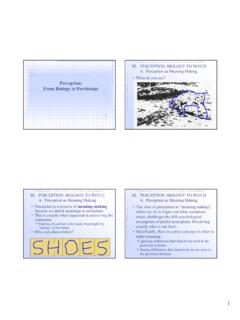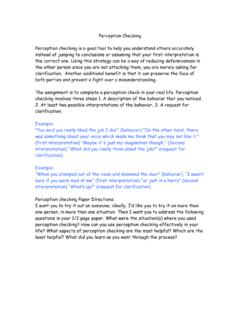Transcription of SELECTIVE PERCEPTION - University of Arizona
1 CHAPTER1 SELECTIVEPERCEPTION"Wedonotfirstsee,then define,wedefinefirstandthensee."-WalterL ippmann(citedinSnyder&Uranowitz,1978) , , ,butaswillbecomeclear, , (1949).BrunerandPostmanpresentedpeoplewi thaseriesoffiveplayingcardsonatachis-tos cope(amachinethatcandisplaypicturesforve rybriefintervals), !BrunerandPostmanfoundthatittookpeoplemo rethanfourtimeslongertorecognizeatrickca rdthananor-malcard,andtheyfoundthatmostr eactionstotheincongruitycouldbecategoriz edasoneoffourtypes:dominance,compromise, disrup-tion, "perceptualdenial."Forexample,facedwitha blackthreeofhearts, ,formisdominantandcolorisassimilatedtopr iorexpectations,andinthesecondcase,color 1516 PERCEPTION ,MEMORY, 'sexperi-ment,27of28subjects(or96percent ofthepeople) ,someofBrunerandPostman' "greyish"fourofspades,orthataredsixofclu bswas"thesixofclubsilluminatedbyredlight "(remember,experi-mentalsubjectswereshow nthecardsonatachistoscope).
2 HalfofBrunerandPostman'ssubjectsshowedco mpromiseresponsestoredcards, , ,butwhenithappened, ,oneexperimentalsubjectexclaimed:"Idon't knowwhatthehellitisnow, 'saplayingcard."Likewise,anothersubjects aid:"Ican'tmakethesuitout, ' 'tknowwhatcoloritisnoworwhetherit' 'mnotevensurenowwhataspadelookslike!MyGo d!"Thefinalreactionwas,ofcourse, , ,sixofBrunerandPostman' ,asubjectwhowasshownaredsixofspadesthoug htthesymbolswerereversed,andasubjectwhow asshownablackfourofheartsdeclaredthatthe spadeswere"turnedthewrongway." ,wordsofBrunerandPostman( ):"Perceptualorgani-zationispowerfullyde terminedbyexpectationsbuiltuponpastcom-m ercewiththeenvironment."Whenpeoplehaveen oughexperiencewithaparticularsituation, # ,youwereaskedtocounthowmanytimesthelette rfappearedinthefollowingsentence:Thesefu nctionalfuseshavebeendevelopedafteryears ofscientificinvestigationofelectricpheno mena, (Block&Yuker,1989).
3 Thecorrectansweris11(includ-ingfourtimes inwhichfappearsinthewordof).Becauseexper iencedSELECTIVEPERCEPTION17speakersprono uncethewordofwitha"v"sound,theyhavemored iffi-cultydetectingtheseoccurrencesofthe letterfthandoinexperiencedspeakers,andas a result, ,youaretold,istodrinkavodkaandtonic,wait twentyminutesforthealcoholtoenteryourblo odstream, ,handsyoutheglass, ,afemaleassistantenterstheroom,sitsdown, (1977)conductedthisexperiment,theyfoundt hatsubjectswhothoughttheyhadbeengivenavo dkaandtonicshowedmuchsmallerincreasesinh eartratethansub-jectswhothoughttheyhadbe engiventonicwateralone-regardlessofwheth ersubjectshadactuallyingest~ ; ,StephenSmith,andElisabethWells-Parker(1 989) , "sensationseekers"wholikedtotakerisks,an dothershadbeenidentifiedaslow"sensations eekers."Then,halfanhourafterdrinkingthei rbeverages, ,rightlyorwrongly, , (Jones,1971).18 PERCEPTION ,MEMORY, (TakenfromHastodandCantril,1954.)
4 ThisdifferenceofopinionledHastorfandCant riltowonderwhetherDartmouthandPrincetons tudentswereactuallyseeingdifferentgames, ,theyaskedanewgroupofstudentsateachschoo ltowatcha , , ( ),whereasPrincetonstudentssawtheDartmout hteamcommitmorethantwiceasmanyinfraction sasthePrincetonteam( ).Infact,therewassuchadiscrepancyinperce ptionsthatwhenPrincetonsentacopyofthefil mtoseveralDartmouthalum-niforagroupshowi ng,oneDartmouthalumnuswhopreviewedthefil mcouldnotseeanyoftheDartmouthinfractions and,inconfusion,sentPrincetonatelegramas kingfortherestofthefilm!Basedonthesediff erencesinperception,HastorfandCantril(19 54, )concludedthat:"Itseemsclearthatthe'game ' ,DDartmouthinfractionsVl:JIIIP rinceton'" 'U<l)6C<l) '-'-'0'""'<l) :::l3'"<l)b!Jto'""'2<l); ::IntheseexperimentsandtheexperimentofBr unerandPostman,people' "cognitive" ; ,desires,andemotionalattachmentsareknown as"motivational" ,1951,theDartmouthandPrincetonfootballte amswentheadtoheadinPrincetonUniversity' , 'sstarplayer,whohadjustappearedonthecove rofTimemagazine, , , ,fourdaysafterthegame,awriterfortheDaily Princetonian(Princeton'sstu-dentnewspape r)declared:"Thisobserverhasneverseenquit esuchadisgustingexhibitionofso-called'sp ort.
5 'Bothteamswereguiltybuttheblamemustbelai dprimarilyonDartmouth' ,obvi-ouslythebetterteam,hadnoreasontoro ughupDartmouth."Onthesameday,theDartmout h(Dartmouth'sundergraduatenewspaper)char gedthatPrinceton'scoachhadinstilleda"see -what-they-did-go-get-themattitude" , (asocialpsychologistthenatDartmouth)andH adleyCantril(aPrincetonsurveyresearcher) .Capital-izingonthecontroversy,Hastorfan dCantril(1954) ,amongothers:"Fromwhatyousawinthegameort hemovies,orfromwhatyouhaveread,whichteam doyoufeelstartedtheroughplay?"Notsurpris ingly, ,53percentassertedthatbothsidesstartedit , ,86percentofthePrincetonstudentsfeltthat Dartmouthhadstart-edit, ,MEMORY,ANDCONTEXT differentpeoplehavedifferent'attitudes'c oncerningthesame'thing.'Forthe'thing'sim plyisnotthesamefordifferentpeoplewhether the'thing'isafootballgame,apresidentialc andidate,Communism,orspinach."In1981,Joh nLoyandDonaldAndrewscarefullyreplicatedH astorfandCantril'sstudy, ,RobertVallone,LeeRoss,andMarkLepper(198 5) ,Ross,andLeppercalledthisphenomenonthe"h ostilemediaeffect," ,theyasked160registeredvoterstoindicatew hethermediacoverageofthecandidateshadbee nbiased,andifso, ,andinrougWy90per-centofthesecases, ,Vallone,Ross,andLepper(1985)conductedas econdstudyinwhich68"pro-Israeli"colleges tudents,27"pro-Arab"students,and49"gener allymixed"or"neutral"studentswatchedthes amesetoftelevisednewssegmentscoveringthe tragicBeirutmassacre(in1982,a seriesofArab-Israeliconflictshadresulted inthemassacreofArabciviliansintherefugee campsatSabraandChatilla,Lebanon).
6 ,Vallone,Ross, ,pro-Israelistudentsthoughtthesegmentswe rebiasedagainstIsrael, ,pro-Arabstudentsfeltthatthenewsprograms hadexcusedIsrael"whentheywouldhaveblamed someothercountry,"whereaspro-Israelistud entsfelttheprogramsblamedIsrael"whenthey wouldhaveexcusedsomeothercountry."Asinth ecaseoftheDartmouth-Princetongame,Vallon e,Ross,andLepperfoundthatthesedisagreeme ntswerenotsimplydifferencesofopinion; , , ,ontheotherhand, ,pro-Israelistu-dentsthoughtthatmostneut ralviewerswouldbecomemorenegativetowardI sraelasaresultofwatchingthenewsclips, ,Ross, ,arbitration, ,whenpeoplebecomecommittedtoaparticularc auseoracourseofaction, ,bytheirverynature, ' ,beforemakitiganiniportantjudgmentordeci sion,itoftenpaystopauseandaska fewkeyquestions:AmImotivatedtoseethingsa cer-tainway?WhatexpectationsdidIbringint othesituation?WouldIseethingsdifferently withouttheseexpectationsandmotives?
7 HaveIcon-sultedwithotherswhodon'tsharemy expectationsandmotives?Byaskingsuchquest ions,decisionmakerscanexposemanyofthecog ni-tiveandmotivationalfactorsthatleadtob iasesinperception.









